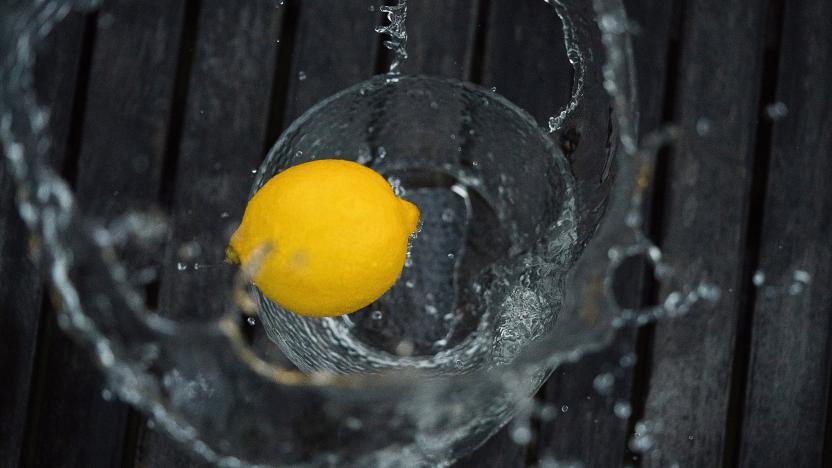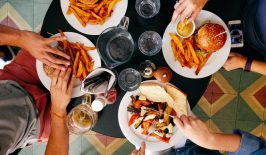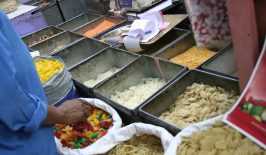Organic, invisible and completely edible – could Edipeel be the solution we need to drastically cut back on global food waste?
Every year around the world, around 1.3 billion tons of food are thrown away – roughly one third of total production. According to the FAO, fruits and vegetables are particularly at risk, with around half of all of this nutrient-rich produce going bad before it ever reaches our plates. And at the same time, millions of people are starving in many regions around the world. Not to mention the fact that food production and supply – cultivation, storage and transportation – is energy-intensive and pollutes the environment with both pesticides and CO2 emissions.
Waste is created all along the supply chain, but it’s food’s shelf life that is the key issue. Take bananas for instance: After being grown for months, travelling for weeks and then finally ending up in the fruit aisle of the supermarket, their incredibly resource-intensive life often ends up in the bin after just a few short days after they’ve been unpacked.
One way of extending food’s shelf life – without polluting the environment with other waste or pesticides in the process – could soon be Edipeel, a new invention from the startup Apeel.
The idea was conceived by James Rogers, a materials researcher at the University of California. While he primarily works with steel and plastics in the production of solar cells, at some point he started asking himself why it is that we live in a world where we grow so much, yet at the same time so many people still go hungry. The issue must lie in the distribution, he decided, and the limited shelf life of fresh food.
Each fruit has its own microclimate
So how can fresh food be protected more effectively? After extensive work in the lab, the startup Apeel came up with a special coating, called Edipeel, that is just about to be launched in the European market. Edipeel is a layer that covers the fruit like a second skin, creating a barrier that controls how much water and carbon dioxide the fruit releases and how much oxygen enters from the outside. These three factors are the main ones responsible for the shelf life of fruits and vegatables.
“A new, better microclimate is created inside the avocado or the lemon,” Rogers told German newspaper Süddeutsche Zeitung. “The microclimate travels with the fruit, from harvest to fridge.” This second layer means that fruits last much longer – a strawberry, for example, stays edible for at least one whole week longer.
The coating is primarily made of organic plant waste – such as shells, stems or pips, depending on what is regionally available. In California, where the company is based, Edipeel works with the leftovers from winemaking. A chemical process transforms the scraps into a powder that farmers can mix with water immediately after harvest and spray onto the fruits or vegetables. Each spray has a different make-up – the mixture used for citrus fruits is different to the one used for bananas or aubergine.
Apeel currently has 82 employees and has raised 42 million USD in venture capital, including Silicon Valley investors such as Andreessen Horowitz and the Foundation of Bill and Melinda Gates.
Bye-bye refrigerator
Big supermarket chains could benefit hugely from Edipeel – because they are the ones who have to deal with the issue of over-ripe or unripe fruits and vegetables on a daily basis. Being able to prevent fruits and vegetables from ageing prematurely, and ending up in the bin instead of the supermarket trolley, would be a huge step forward.
And Edipeel could help farmers too: those growers who were limited to selling only to regional markets due to their lack of access to expensive cold chains that keep food fresh on longer journeys. During one of the company’s first projects, Rogers and the Gates Foundation developed a coating for cassava and mangos for small farmers in Kenya and Nigeria, allowing them access to the European market.
The companies that organise cold chains and organise the transportation of chilled products may well be less excited about the development. It’s estimated that Edipeel keeps fruit fresh for four times as long as normal – just as long as refrigerating it does – meaning refrigeration services and cold chains would no longer be needed.
Edipeel has already been approved by the Food Authorities in the US, Mexico, Chile, Peru, Japan and China and Rogers hopes to get EU approval later this month. So, fruits and vegetables really might be delivered to us complete with an anti-ageing shell sooner than we think. Wouldn’t it be great if this new coating could help us do away with plastic packaging too?
This is a translation by Ana Galan of the original article which first appeared on RESET’s German-language site.







